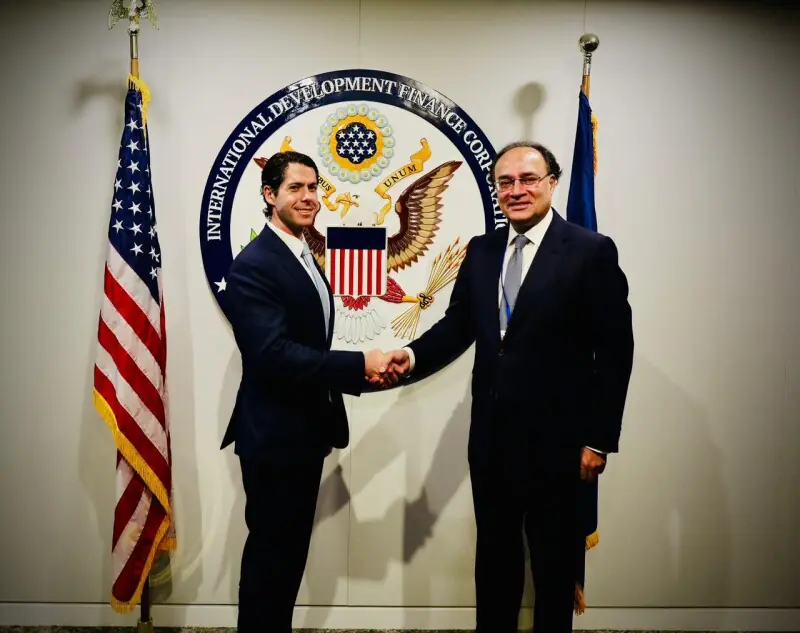Finance Minister Muhammad Aurangzeb, in a meeting with Benjamin Black, CEO of the US International Development Finance Corporation (DFC), highlighted Pakistan’s vast investment potential across the oil and gas, minerals, agriculture, IT, and pharmaceutical sectors, while welcoming the DFC’s interest in facilitating private sector-led financing for development projects.
Aurangzeb, who is on an official trip to the United States, held a series of high-level engagements on the sidelines of the IMF–World Bank Annual Meetings in Washington DC, focusing on advancing investment partnerships, strengthening bilateral and multilateral cooperation, read a statement released by the Finance Division.
During his meeting with Black, he underscored the consensus at the leadership level to enhance trade and investment ties, welcoming the DFC’s interest in facilitating private sector-led funding for projects in Pakistan.
In a separate meeting, Aurangzeb met with Azerbaijan’s First Deputy Finance Minister, Anar Karimov, reaffirming strong economic and strategic ties between the two countries.
He congratulated Azerbaijan on successfully hosting COP29 and highlighted the Pakistan-Azerbaijan Preferential Trade Agreement (January 2025) and Transit Trade Agreement (December 2024) as key platforms to diversify bilateral trade beyond oil and rice into textiles, pharmaceuticals, chemicals, machinery, and agricultural products.
Aurangzeb briefs Saudi counterpart on PIA, airport privatization drive
Aurangzeb also met with Hiroshi Matano, Executive Vice President of MIGA, expressing appreciation for MIGA’s support in ongoing arbitration matters and reaffirming Pakistan’s commitment to safeguarding both investor confidence and national interests.
He welcomed MIGA’s proposal for a short-term trade finance facility to ensure access to critical imports such as food, fertiliser, energy, and essential machinery, and emphasised the importance of its timely implementation.
He also acknowledged MIGA’s continued support for Pakistan’s power transmission and distribution sectors.
At the Borrowers’ Forum Roundtable, the finance minister discussed the crucial balance between servicing high debt obligations and financing essential social sector investments.
He commended the establishment of the Forum as a valuable platform for collective action, knowledge sharing, and policy coordination among debtor nations.
He stressed the importance of improved debt management, enhanced technical capacity, and better access to sustainable finance for climate resilience and infrastructure development.
Aurangzeb met with members of the Pakistan Bank Fund Staff Association (PBFSA). He briefed them on recent fiscal, monetary, and external sector progress and referenced the country’s upgraded sovereign credit ratings.
He reaffirmed Pakistan’s commitment to fiscal responsibility, energy reforms, privatisation, social protection, and inclusive green growth while responding to participant queries.
Later, Aurangzeb held a productive meeting with the senior management of Standard Chartered Bank, acknowledging the long-standing partnership between the bank and Pakistan. During the discussions, the minister highlighted the external validation of the country’s ongoing economic reforms by international rating agencies.
He briefed the team on Pakistan’s recent Panda Bond issuance and plans to tap international capital markets through Eurobonds and International Sukuk.
The meeting also covered trade financing facilities, with the minister requesting the bank to share additional proposals for consideration to further strengthen collaboration.
Earlier in the day, Aurangzeb also addressed global investors at the Citi Macro Forum, Senator Aurangzeb, alongside the Secretary of Finance and the Governor of the State Bank of Pakistan and presented a comprehensive overview of the positive developments on Pakistan’s fiscal, monetary, and external fronts.
He attributed the current economic momentum to effective stabilisation measures, structural reforms, and prudent monetary management, noting the successful negotiation of a Staff-Level Agreement with the IMF.
Senator Aurangzeb subsequently joined Finance Ministers and Central Bank Governors from the MENAP region in a meeting with IMF Managing Director Kristalina Georgieva.
As a lead speaker, he underscored Pakistan’s achievement of macroeconomic stabilisation and welcomed the staff-level agreement with the IMF.
He reaffirmed the government’s commitment to advancing reforms in taxation, energy, state-owned enterprises, and privatisation. He highlighted Pakistan’s digital transformation and tariff policy aimed at enhancing competitiveness and exports, while inviting international investment in key sectors, including mining, digital infrastructure, agriculture, and pharmaceuticals.
Winding up his day’s engagements, Aurangzeb interacted with leading Pakistani entrepreneurs over a working dinner, hosted by Ambassador Rizwan Saeed Sheikh at Pakistan House.
The minister briefed the participants about the economic outlook of the country, including macroeconomic stability and structural reforms. He highlighted streamlining of regulatory processes, improving taxation system, and addressing issues related to energy, SEOs and privatisation.


